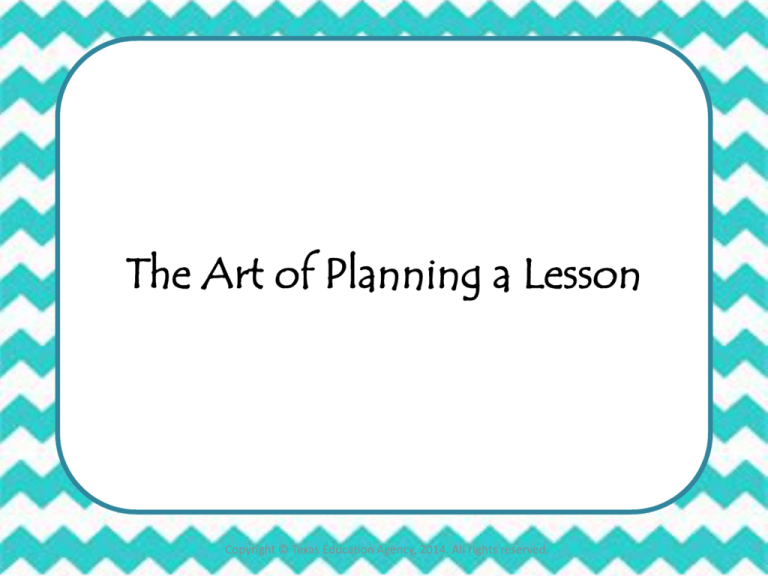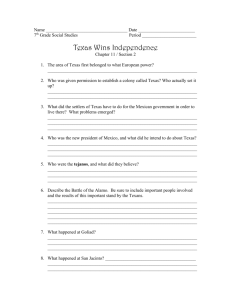
The Art of Planning a Lesson
Copyright © Texas Education Agency, 2014. All rights reserved.
Copyright
Copyright © Texas Education Agency, 2014. All rights reserved.
If you fail to plan, you
plan to fail.
~Benjamin Franklin
Copyright © Texas Education Agency, 2014. All rights reserved.
Well-Planned Lesson
• Achieves the objectives
• Encourages reflection, refinement and
improvement
• Enhances student achievement
• Helps teachers to avoid “unpleasant”
surprises
• Keeps the teacher and students on track
• Provides direction to a substitute teacher
• Provides the roadmap and visuals in a logical
sequence
Copyright © Texas Education Agency, 2014. All rights reserved.
Poor Planning
•
•
•
•
•
•
•
•
Aimless wandering
A waste of time
Few connections to prior learning
Lack of needed materials
Frustration for the teacher and students
Poor management
Unmet objectives
Unorganized
Copyright © Texas Education Agency, 2014. All rights reserved.
Begin With The Big Picture
Take the time to
thoroughly
examine and
LEARN the Texas
Essential
Knowledge and Skills
(TEKS) for your
course(s)
Copyright © Texas Education Agency, 2014. All rights reserved.
Real World Connections
Copyright © Texas Education Agency, 2014. All rights reserved.
Access Your Course TEKS and Scope
and Sequence
Locate your course Scope and Sequence
(click on picture)
Copyright © Texas Education Agency, 2014. All rights reserved.
The greater the structure of a lesson
and the more precise the directions
on what is to be accomplished, the
higher the achievement rate.
Harry Wong, The First Days of
Teaching
Copyright © Texas Education Agency, 2014. All rights reserved.
Cognitive Development
Creating
Evaluating
Analyzing
Applying
Understanding
Remembering
Bloom’s Taxonomy
Copyright © Texas Education Agency, 2014. All rights reserved.
10
Types of Lesson Plans
•
•
•
•
Five step
Five E
Weekly lesson plan
Gold Seal Lesson
Copyright © Texas Education Agency, 2014.
All rights reserved.
Lesson Plan Basics
• Title
• TEKS
• Objectives
• Make sure the TEKS you select and
your objectives are in alignment
• Duration of lesson
• Important terms and definitions
• Materials/specialized equipment
needed
Copyright © Texas Education Agency, 2014. All rights reserved.
Basic Direct Teach Lesson Plan
Components
• Anticipatory set
• Direct instruction
• Guided practice
• Independent practice
• Lesson closure
• Assessment
Copyright © Texas Education Agency, 2014. All rights reserved.
Anticipatory Set
• Be creative
• Provides focus, also called the “hook”
• Short activity that draws the students' attention
before the lesson actually begins
• Use props, visuals or music followed by questions and
answers or brainstorming session
Copyright © Texas Education Agency, 2014. All rights reserved.
Direct Instruction
• Continuously check for understanding.
• Ensure your lesson is rigorous and relevant to the
students.
• Implement accommodations from IEPs for special
education students.
• Introduce new vocabulary.
• Keep learning styles in mind
• Model and show students what you want them to
know.
• Provide examples and scenarios students can relate to.
• Use slide presentations or graphic organizers.
Copyright © Texas Education Agency, 2014. All rights reserved.
Guided Practice
• Can be done individually or cooperatively.
• Ensure activity is rigorous and relevant to the
students
• Implement accommodations from IEPs for special
education students
• Provide guidance as students solve real world
problems
• Provide hands-on activities and opportunities that
allow students to practice their newly learned skills
and concepts
• Walk students through the learning process
Copyright © Texas Education Agency, 2014. All rights reserved.
Independent Practice
• Allow students to use critical thinking skills as
they practice completing lesson, assignment,
project on their own
• Ensure assignment/activity is rigorous and
relevant. Aim for having students solve a
problem that will have unpredictable
outcome or solution
• Implement accommodations from IEPs for
special education students
Copyright © Texas Education Agency, 2014. All rights reserved.
Lesson Closure
• Develop, research or borrow creative
review techniques
• Implement accommodations from IEPs
for special education students
• Students recap what you have taught
and what they have learned (and how it
relates to them)
• Wrap up the lesson
Copyright © Texas Education Agency, 2014. All rights reserved.
Assessment
• Completion of a lab evaluation
• Culmination of a project or presentation
assessed with a rubric
• Hands-on experiment
• Implement accommodations from IEPs for
special education students
• Independently performed task
Copyright © Texas Education Agency, 2014. All rights reserved.
Assessment
• Independent written reflection of what
the student learned from this
topic/lesson/lab
• Open-ended question test
• Quiz or test
• Student reflection or other concrete
method
Copyright © Texas Education Agency, 2014. All rights reserved.
Additional Components to a Lesson Plan
Copyright © Texas Education Agency, 2014. All rights reserved.
Additional Components
• English Language Proficiency Standards
(ELPS) Strategies
• Reading Strategies
• Word Wall
Copyright © Texas Education Agency, 2014. All rights reserved.
English Language Proficiency
Standards (ELPS) Strategies
What is ELPS?
ELPS are basically the “TEKS” for linguistic development, statutory
addition to the required curriculum of every subject. They can be found
in chapter 74.4 of the Texas Administrative Code; right along with the
requirements for elementary and secondary curricula :
http://ritter.tea.state.tx.us/rules/tac/chapter074/ch074a.html
Copyright © Texas Education Agency, 2014. All rights reserved.
Reading Strategies
• Encourage students to “make predictions” about the text content prior
to reading. “I think it’s going to be about……. because I know (I
heard)………………….
•
Encourage students to “visualize” as they read. Many students are
visual learners and will benefit from making sketches or diagrams on
scrap paper as they read
• Have students form their own questions about the text prior to reading
or have them write down any questions that come to mind as they are
reading
Copyright © Texas Education Agency, 2014. All rights reserved.
Word Wall
The use of a word wall and definitions is an ELPS strategy.
Other strategies include:
• Frayer Model
• Examples/Not Examples
• Problems/Solutions
Copyright © Texas Education Agency, 2014. All rights reserved.
Lesson Planning 101
(click on picture)
Copyright © Texas Education Agency, 2014. All rights reserved.
“To be prepared is half
the victory.”
~ Miguel de Cerantes
Saavedra
Copyright © Texas Education Agency, 2014. All rights reserved.
Questions?
Copyright © Texas Education Agency, 2014. All rights reserved.
References and Resources
Images:
Microsoft Clip Art: Used with permission from Microsoft.
Books:
Early Childhood Education Today, Twelfth Edition by George S. Morrison
This book is a great resource on early childhood education. It covers the foundation of
education, programs and resources for children and families, educational needs of infants
through the primary grades and the special needs of children and families.
Introduction To Teaching: Becoming A Professional. (Fifth ed.). by Don Kauchak & Paul Eggen
For any student going into the teaching profession, this is an excellent choice. It is an easy read
for students on all levels. It covers the changing teaching profession, the foundations of
education and how to become an effective teacher.
Websites:
New Teacher Academy: Lesson Planning
Lisa Dabbs explains the importance of effective lesson planning for new teachers.
http://www.edutopia.org/blog/new-teacher-lesson-planning-lisa-dabbs
Planning a Lesson
The National Capital Language Resource Center gives detailed explanations and examples on
how to write a lesson plan from beginning to end.
http://www.nclrc.org/essentials/planning/plindex.htm
Copyright © Texas Education Agency, 2014. All rights reserved.
References and Resources
Strategies for Effective Lesson Planning
Effective lesson planning can be tricky, but with this website from the University of Michigan,
lesson planning can be a stress-free encounter.
http://www.crlt.umich.edu/gsis/p2_5
Texas Association of Future Educators (TAFE)
Advisor Handbook – Competitive Events
http://www.tafeonline.org/?page=CompetitiveEvents
YouTube™:
Lesson Planning 101
Dr. Linda Karges-Bone gives a workshop for new teachers, critical needs teachers, schools with
low test scores and schools serving at-risk populations.
https://www.youtube.com/watch?v=Yk1mi1egpgk
Copyright © Texas Education Agency, 2014. All rights reserved.







